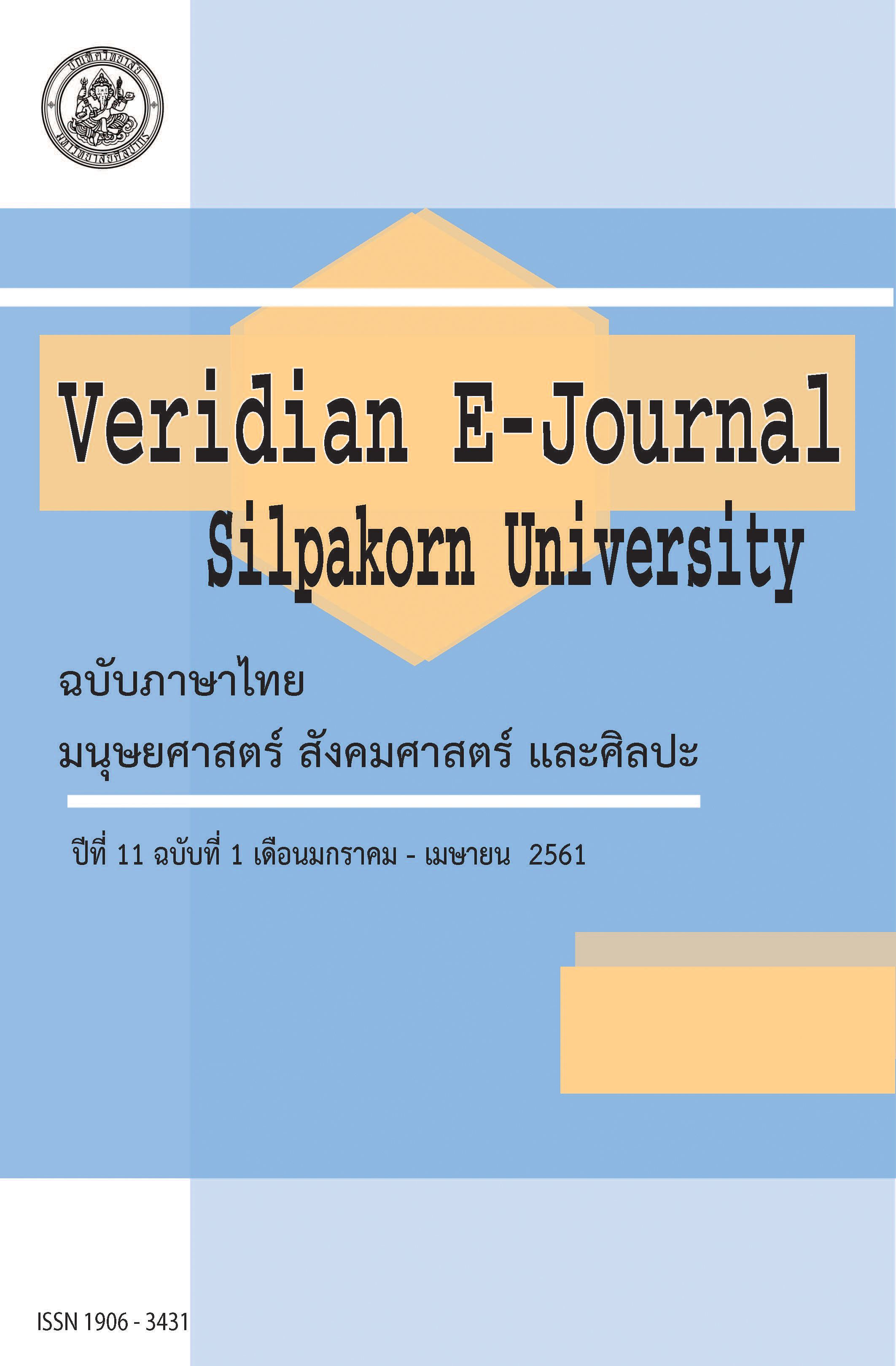การสร้างกิจกรรมการละเล่นเพื่อเสริมสร้างทักษะทางสังคมของ เด็กที่มีภาวะสมาธิสั้นอายุ 6-9 ปี (The Development of Thai Traditional Games to Enhance the Social Skills of ADHD Children 6-9 Years Old.)
Main Article Content
Abstract
งานวิจัยนี้เป็นการวิจัยเชิงทดลอง มีความมุ่งหมายเพื่อสร้างกิจกรรมการละเล่นเพื่อเสริมสร้างทักษะทางสังคมของเด็กที่มีภาวะสมาธิสั้นอายุ 6-9 ปี โดยศึกษาผลก่อนและหลังการใช้กิจกรรมการละเล่นเพื่อเสริมสร้างทักษะทางสังคมของเด็กที่มีภาวะสมาธิสั้น กลุ่มประชากรที่ใช้ในการวิจัยเป็นเด็กที่ได้รับการวินิจฉัยจากแพทย์ว่ามีภาวะสมาธิสั้น จำนวน 6 คน โรงเรียนพระมหาไถ่ศึกษา กรุงเทพมหานคร โดยใช้แบบแผนการทดลองแบบ The One Group Pretest – Posttest Design ผลการศึกษาสรุปว่า 1) การสร้างกิจกรรมการละเล่นเพื่อเสริมสร้างทักษะทางสังคมของเด็กที่มีภาวะสมาธิสั้น โดยใช้ทฤษฎีพหุปัญญา 2 ด้าน คือด้านการเข้าใจตนเอง และด้านมนุษยสัมพันธ์ มาผสมผสานกับการการละเล่นไทย ทฤษฎีการเรียนรู้ทางสังคม ทฤษฎีกระบวนการกลุ่ม และจิตวิทยาสำหรับเด็ก มาใช้ในการสร้างกิจกรรมเพื่อเสริมสร้างทักษะทางสังคมที่สอดคล้องกับเด็กที่มีภาวะสมาธิสั้น ซึ่งชุดกิจกรรมการละเล่นมีระยะเวลาในการทำกิจกรรม จำนวน 4 สัปดาห์ๆ ละ 3 ครั้ง เป็นจำนวนทั้งสิ้น 12 ครั้ง ครั้งละ 40 นาที จากการพิจารณาค่าความสอดคล้อง (IOC) จากผู้ทรงคุณวุฒิ สรุปได้ว่าผู้ทรงคุณวุฒิมีความคิดเห็นว่าสอดคล้องกันและมีความเหมาะสมของกิจกรรมการละเล่นโดยภาพรวมอยู่ในระดับดีมาก 2) ผลการใช้กิจกรรมการละเล่นเพื่อเสริมสร้างทักษะทางสังคมของเด็กที่มีภาวะสมาธิสั้นอายุ 6-9 ปี พบว่า กิจกรรมการละเล่นช่วยเสริมสร้างทักษะทางสังคมของเด็กที่มีภาวะสมาธิสั้น โดยภาพรวมอยู่ในระดับมาก
แต่เมื่อพิจารณาข้อย่อยในแต่ละกิจกรรมพบว่า มีค่าเฉลี่ยทักษะทางสังคมที่แตกต่างกันเรียงจากมากไปหาน้อยได้แก่ ด้านมนุษยสัมพันธ์ และด้านการเข้าใจตนเอง โดยมีค่าเฉลี่ยเท่ากับ 2.50 และ 2.47และค่าส่วนเบี่ยงเบนมาตราฐานเท่ากับ 0.120 และ 0.361 3.) ผลการทดลองพบว่าเด็กสมาธิสั้นมีคะแนนทักษะทางสังคม ด้านการเข้าใจตนเอง และด้านมนุษยสัมพันธ์ในระยะหลังทดลองสูงกว่าก่อนทดลองอย่างมีนัยสำคัญทางสถิติที่ระดับ .05
This study is experiment research. The purpose of this research was to create Thai Traditional Games to enhance the social skills of ADHD children 6 - 9 years old by studying the results before using games and the results after using games to enhance the social skills of children with ADHD.The population of this study consisted of 6 children with ADHD who was diagnosed by doctors in Pramahataisuksa School, Bangkok.The experiment plan was based on One Group Pretest–Posttest Design, and the results were as follows.1.) Able to create activities by using two sides of the principle of multiplying intelligence, which were intrapersonal, interpersonal and adapted with Thai traditional games, social learning theory, group process and child psychology to create games to enhance social the skills of children with ADHD. These games lasted 4 weeks and ran for 3 days a week for a total of 12 times and at 40 minutes per time. The results were submitted to be considered and reviewed with the IOC (Index of Item-Objective Congruence) by a group of experts. It was found that all of the experts agreed to its conformity and rated the appropriation of these activities with the top score; 2.) the results found that the overview was at a high level; 3.) the results were found that children with ADHD had social skills in terms of intrapersonal, linguistic, and interpersonal after the experiment was higher than prior to the experiment at a statistically significant level at 0.5
